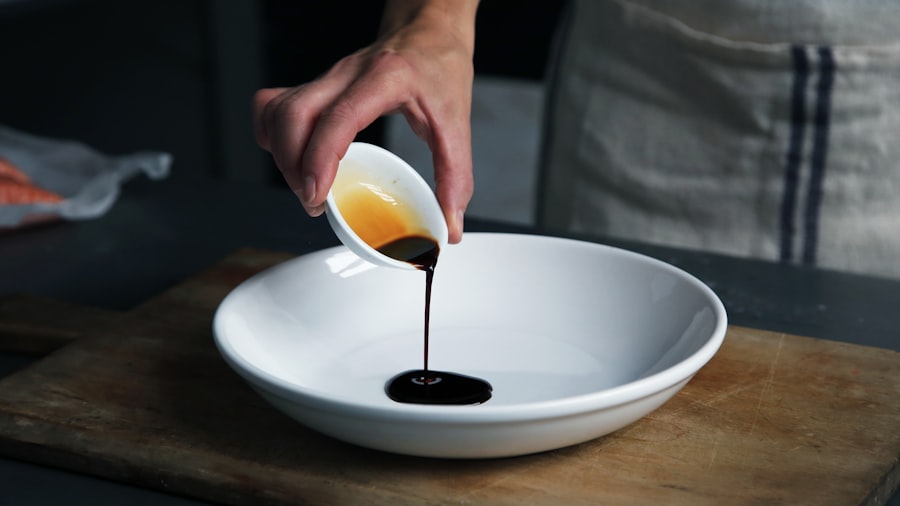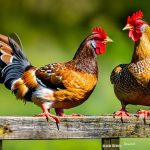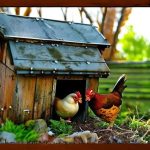Maintaining the health of chickens and preventing parasite infestations is crucial for both commercial poultry farmers and hobbyist chicken keepers. While numerous commercial products are available for deworming chickens, some farmers are exploring natural alternatives, including vinegar. Vinegar has been utilized for its medicinal properties for centuries, and its potential as a natural deworming agent for chickens has garnered interest within the poultry industry.
This article examines the efficacy of vinegar for worm control in chickens, including proper administration methods, potential limitations, and comparisons with commercial deworming products. Additionally, it provides guidance on integrating vinegar into a comprehensive chicken health management strategy. By exploring these topics, readers can gain a better understanding of the potential benefits and drawbacks of using vinegar as a natural deworming solution for their poultry.
Table of Contents
- 1 The benefits of using vinegar as a natural wormer for chickens
- 2 How to administer vinegar to chickens for worm control
- 3 Potential drawbacks or limitations of using vinegar for worm control in chickens
- 4 Comparing vinegar to other commercial worming products for chickens
- 5 Tips for incorporating vinegar into a holistic approach to chicken health and wellness
- 6 the potential of vinegar as a natural solution for keeping chickens worm-free
- 7 FAQs
- 7.1 What is the article “Does Vinegar Keep Chickens Worm-Free” about?
- 7.2 How does vinegar work to keep chickens worm-free?
- 7.3 Is vinegar a proven method for keeping chickens worm-free?
- 7.4 Are there any potential risks or side effects of using vinegar for chickens?
- 7.5 What are some other methods for keeping chickens worm-free?
Key Takeaways
- Vinegar can be used as a natural wormer for chickens, providing an alternative to commercial products.
- Using vinegar for worm control in chickens can help improve their overall health and wellness.
- Administering vinegar to chickens can be done by adding it to their drinking water or mixing it with their feed.
- While vinegar can be effective, it may not completely eliminate all types of worms in chickens.
- When comparing vinegar to commercial worming products, it’s important to consider the potential benefits and limitations of each option.
The benefits of using vinegar as a natural wormer for chickens
Creating an Unhospitable Environment for Parasites
When used as a natural wormer, vinegar helps create an environment in the chicken’s digestive system that is less hospitable to parasites. The acetic acid in vinegar breaks down the exoskeletons of certain types of worms, making it difficult for them to survive in the chicken’s digestive tract.
Maintaining a Healthy pH Balance and Reducing Chemical Resistance
Vinegar also helps maintain a healthy pH balance in the chicken’s gut, which is essential for overall digestive health and prevents the overgrowth of harmful parasites. Using vinegar as a natural wormer may reduce the risk of chemical resistance that can occur with some commercial worming products, making it a sustainable option for long-term parasite control.
Additional Health Benefits for Chickens
On top of its potential as a natural wormer, vinegar offers additional health benefits for chickens. It promotes overall digestive health, improves nutrient absorption, and supports a healthy immune system. Regular use of vinegar in chicken water has also been reported to reduce the occurrence of common poultry ailments, such as respiratory infections and diarrhea. Overall, using vinegar as a natural wormer for chickens contributes to the overall health and well-being of the flock.
How to administer vinegar to chickens for worm control

Administering vinegar to chickens for worm control is a relatively simple process. Many poultry farmers choose to add a small amount of apple cider vinegar to their chicken’s drinking water on a regular basis. The recommended ratio is typically around 1-2 tablespoons of apple cider vinegar per gallon of water.
It’s important to use raw, unfiltered apple cider vinegar with the “mother,” as this type of vinegar contains beneficial enzymes and probiotics that can further support digestive health in chickens. The vinegar can be added directly to the waterer, and it’s important to provide fresh water with vinegar daily to ensure that the chickens are receiving an adequate dose. Another method of administering vinegar for worm control is to mix it with the chicken feed.
Some poultry farmers choose to soak their chicken feed in a mixture of water and apple cider vinegar before feeding it to their flock. This allows the vinegar to be absorbed by the feed, ensuring that the chickens consume it with their meals. Regardless of the method chosen, it’s important to monitor the chickens’ behavior and health closely when introducing vinegar into their diet, as some chickens may be more sensitive to dietary changes than others.
Potential drawbacks or limitations of using vinegar for worm control in chickens
While vinegar can offer several benefits as a natural wormer for chickens, there are also potential drawbacks and limitations to consider. One limitation is that vinegar may not be effective against all types of poultry parasites. While it may help to control certain types of worms, such as roundworms and tapeworms, it may not be as effective against other types of parasites, such as mites or lice.
Additionally, the effectiveness of vinegar as a natural wormer may vary depending on the specific conditions and environment in which the chickens are raised. Another potential drawback is that using vinegar as a natural wormer may require more frequent administration compared to some commercial products. While some commercial worming products offer long-lasting protection with a single dose, vinegar may need to be administered on a regular basis to maintain its effectiveness.
This can be more labor-intensive for poultry farmers and may require more careful monitoring of the flock’s health and behavior. It’s also important to note that while vinegar can offer health benefits for chickens when used in moderation, excessive consumption may have negative effects on their digestive health. Overuse of vinegar in the chicken’s water or feed can disrupt the natural pH balance in their digestive system and lead to digestive upset.
As with any natural remedy, it’s important to use vinegar for worm control in chickens judiciously and in consultation with a veterinarian or poultry health expert.
Comparing vinegar to other commercial worming products for chickens
When considering the use of vinegar for worm control in chickens, it’s important to compare its effectiveness and practicality with other commercial worming products available on the market. Many commercial worming products are formulated specifically to target a wide range of poultry parasites, offering broad-spectrum protection with a single dose. These products often contain chemical dewormers that are designed to effectively eliminate parasites and provide long-lasting protection.
In contrast, vinegar may offer a more natural and sustainable approach to worm control, but it may require more frequent administration and monitoring to maintain its effectiveness. Additionally, some commercial worming products may offer faster results and more immediate relief from parasite infestations compared to vinegar. However, it’s important to consider the potential risks associated with chemical dewormers, such as the development of resistance in parasites and potential negative effects on the chicken’s health.
Ultimately, the choice between using vinegar or commercial worming products for chickens will depend on the specific needs and preferences of the poultry farmer, as well as the unique conditions of their flock. Some farmers may choose to incorporate both natural remedies like vinegar and commercial products into their parasite control program to achieve comprehensive protection for their chickens.
Tips for incorporating vinegar into a holistic approach to chicken health and wellness

Choosing the Right Vinegar
Use raw, unfiltered apple cider vinegar with the “mother” for maximum potency and effectiveness.
Monitoring and Adjusting
Monitor the chickens’ behavior and health closely when introducing vinegar into their diet, and adjust the dosage as needed based on their response.
A Comprehensive Approach
Consider incorporating other natural remedies and supplements, such as garlic or probiotics, into the chicken’s diet to support overall digestive health and immune function. Maintain a clean and sanitary coop environment to minimize the risk of parasite infestations and support the overall health of the flock. Consult with a veterinarian or poultry health expert to develop a comprehensive parasite control program that incorporates both natural remedies like vinegar and commercial products when necessary.
the potential of vinegar as a natural solution for keeping chickens worm-free
In conclusion, using vinegar as a natural wormer for chickens offers several potential benefits, including its antibacterial and antiparasitic properties, support for overall digestive health, and potential sustainability compared to some commercial worming products. By administering vinegar regularly in their drinking water or feed, poultry farmers can help to create an environment in their chicken’s digestive system that is less hospitable to parasites while promoting overall health and wellness. While there are potential drawbacks and limitations to consider when using vinegar for worm control in chickens, such as its effectiveness against certain types of parasites and the need for more frequent administration compared to some commercial products, incorporating vinegar into a holistic approach to chicken health and wellness can offer comprehensive parasite control while supporting the long-term well-being of the flock.
Ultimately, the choice between using vinegar or commercial worming products will depend on the specific needs and preferences of the poultry farmer, as well as the unique conditions of their flock. By carefully considering the potential benefits and limitations of using vinegar as a natural wormer for chickens and incorporating it into a comprehensive parasite control program, poultry farmers can help to keep their flock healthy and free from parasites in a sustainable and natural way.
If you’re interested in keeping your chickens healthy and happy, you may also want to check out this article on maintaining the floor of your chicken coop. It offers valuable tips on how to keep your coop clean and free of pests, which is essential for the overall well-being of your flock.
FAQs
What is the article “Does Vinegar Keep Chickens Worm-Free” about?
The article explores the potential benefits of using vinegar as a natural remedy to help keep chickens worm-free.
How does vinegar work to keep chickens worm-free?
Vinegar is believed to create an inhospitable environment for worms in the chicken’s digestive system, making it difficult for them to survive and reproduce.
Is vinegar a proven method for keeping chickens worm-free?
There is limited scientific evidence to support the effectiveness of vinegar as a sole method for keeping chickens worm-free. It is important to consult with a veterinarian for proper worm prevention and treatment.
Are there any potential risks or side effects of using vinegar for chickens?
While vinegar is generally considered safe for chickens in small amounts, excessive use can disrupt the pH balance in their digestive system. It is important to use vinegar in moderation and consult with a veterinarian.
What are some other methods for keeping chickens worm-free?
Regular deworming treatments, maintaining a clean coop and run, providing a balanced diet, and practicing good hygiene are all important factors in keeping chickens worm-free.
Meet Walter, the feathered-friend fanatic of Florida! Nestled in the sunshine state, Walter struts through life with his feathered companions, clucking his way to happiness. With a coop that’s fancier than a five-star hotel, he’s the Don Juan of the chicken world. When he’s not teaching his hens to do the cha-cha, you’ll find him in a heated debate with his prized rooster, Sir Clucks-a-Lot. Walter’s poultry passion is no yolk; he’s the sunny-side-up guy you never knew you needed in your flock of friends!







